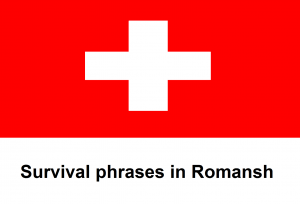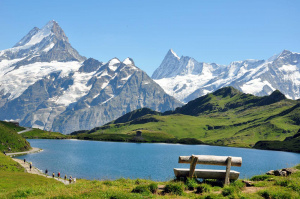Difference between revisions of "Language/Romansh/Vocabulary/Basic-phrases-in-Romansh"
(Added content) Tags: Mobile edit Mobile web edit |
(→Survival phrases in Romansh: Added Puter content) Tags: Mobile edit Mobile web edit |
||
| Line 35: | Line 35: | ||
|- | |- | ||
|Cheers! | |Cheers! | ||
|'''<big>Eviva!</big>''' | |'''<big>Eviva!</big>''' Puter: Viva! | ||
| | | | ||
|- | |- | ||
|Do you speak English? | |Do you speak English? | ||
|'''<big>Discurras ti englais?</big>''' | |'''<big>Discurras ti englais?</big>''' Puter: Discuorrasch tü Inglais? | ||
| | | | ||
|- | |- | ||
|Do you speak Romansh? | |Do you speak Romansh? | ||
|'''<big>Discurras ti rumantsch?</big>''' | |'''<big>Discurras ti rumantsch?</big>''' Puter: Discuorrasch tü Rumauntsch? | ||
| | | | ||
|- | |- | ||
| Line 67: | Line 67: | ||
|- | |- | ||
|Good morning | |Good morning | ||
|'''<big>Bien di</big>''' | |'''<big>Bien di</big>''' Puter: Bun di | ||
| | | | ||
|- | |- | ||
|Good night | |Good night | ||
|'''<big>Buna notg</big>''' | |'''<big>Buna notg</big>''' Puter: Buna nott | ||
| | | | ||
|- | |- | ||
|Goodbye | |Goodbye | ||
|'''<big>Chau</big>''' | |'''<big>Chau</big>''' Puter: Arrivai | ||
| | | | ||
|- | |- | ||
|Hello | |Hello | ||
|'''<big>Ciao</big>''' | |'''<big>Ciao</big>''' or Allegra | ||
| | | | ||
|- | |- | ||
|Help! | |Help! | ||
|'''<big>Agid!</big>''' | |'''<big>Agid!</big>''' Puter: Agüd | ||
| | | | ||
|- | |- | ||
| Line 91: | Line 91: | ||
|- | |- | ||
|How are you? | |How are you? | ||
|'''<big>Co vai?</big>''' | |'''<big>Co vai?</big>''' Puter: Tuot in uorden? / Tuot bun? | ||
| | | | ||
|- | |- | ||
|How do you say ... in Romansh? | |How do you say ... in Romansh? | ||
|'''<big>Co ha ... num per rumantsch?</big>''' | |'''<big>Co ha ... num per rumantsch?</big>''' Puter: Scu as disch … in Rumauntsch? | ||
| | | | ||
|- | |- | ||
| Line 107: | Line 107: | ||
|- | |- | ||
|I love you | |I love you | ||
|'''<big>Jeu carezel tei</big>''' | |'''<big>Jeu carezel tei</big>''' Puter: Eau t’am (Eau is pronounced “aya” to rhyme with slayer). | ||
| | | | ||
|- | |- | ||
| Line 143: | Line 143: | ||
|- | |- | ||
|Reply to 'How are you?' | |Reply to 'How are you?' | ||
|'''<big>Fitg bain, grazia. E ti?</big>''' | |'''<big>Fitg bain, grazia. E ti?</big>''' Puter: Fich bun, grazcha. E tü? | ||
| | | | ||
|- | |- | ||
| Line 155: | Line 155: | ||
|- | |- | ||
|Thank you | |Thank you | ||
|'''<big>Grazia</big>''' | |'''<big>Grazia</big>''' Puter: Grazcha | ||
| | | | ||
|- | |- | ||
Revision as of 12:49, 8 April 2022
Tgau Polyglots!😊
Welcome to our "Rare languages" series lesson.
Today we are going to talk about the Romansh language.
Romansh is a Romance language spoken in the Swiss canton of Grisons (Graubünden).
It is one of the four national languages of Switzerland, with around 40,000 native speakers. The language is not one unified language, but rather a collection of 5 idioms: Puter, Vallader, Sursilvan, Sutsilvan and Surmiran. There are some similarities between them, but many differences too. Whilst a Vallader speaker in the lower Engadin may understand most of what is said by a Puter speaker in the Upper Engadin, there are often spelling and pronunciation differences. Differences between other idioms of Romansh are more extreme, with wholesale differences in vocabulary.
Please find below some basic phrases and interesting videos.
Feel free to complete this wiki page and make it your own!
If you are a native Romansh speaker and you can provide recordings, you can help improve this lesson.
Follow the steps here: https://polyglotclub.com/wiki/Help/How-to-add-audio-files
Survival phrases in Romansh
| English | Rumantsch (Romansh) | Pronunciation (audio files) |
|---|---|---|
| Cheers! | Eviva! Puter: Viva! | |
| Do you speak English? | Discurras ti englais? Puter: Discuorrasch tü Inglais? | |
| Do you speak Romansh? | Discurras ti rumantsch? Puter: Discuorrasch tü Rumauntsch? | |
| Do you understand? | Chapeschas ti? | |
| Excuse me | Perdunai | |
| Fire! | Fieu! | |
| Good afternoon | Buna sera | |
| Good afternoon/evening | Buna sera | |
| Good morning | Bien di Puter: Bun di | |
| Good night | Buna notg Puter: Buna nott | |
| Goodbye | Chau Puter: Arrivai | |
| Hello | Ciao or Allegra | |
| Help! | Agid! Puter: Agüd | |
| Hi! | Tgau! | |
| How are you? | Co vai? Puter: Tuot in uorden? / Tuot bun? | |
| How do you say ... in Romansh? | Co ha ... num per rumantsch? Puter: Scu as disch … in Rumauntsch? | |
| How much is this? | Con cuosta quei ? | |
| I don't understand | Jau na chapesch betg | |
| I love you | Jeu carezel tei Puter: Eau t’am (Eau is pronounced “aya” to rhyme with slayer). | |
| I understand | Jau chapesch | |
| My name is ... | Jeu hai num ... | |
| New Year greetings | In bien niev onn | |
| Over there | Vi leu | |
| Please | Per plaschair | |
| Please say that again | Pudessas ti repeter quai? | |
| Please speak more slowly | Pudessas ti discurrer pli plaun? | |
| Pleased to meet you | Fa plaschair | |
| Reply to 'How are you?' | Fitg bain, grazia. E ti? Puter: Fich bun, grazcha. E tü? | |
| Reply to thank you | Anzi | |
| Sorry | I ma displacha | |
| Thank you | Grazia Puter: Grazcha | |
| Welcome | Bainvegni | |
| What's your name? | Co haveis vus num? | |
| Where's the toilet / bathroom? | Nua è tualetta? | |
| You're welcome | anzi |
Sources
https://omniglot.com/language/phrases/romansh.php
https://en.wikipedia.org/wiki/Romansh_language
https://forum.duolingo.com/comment/26471941/Romansh-Lesson-1-Common-Phrases

